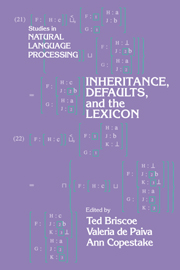Book contents
- Frontmatter
- Contents
- Contributors
- 1 Introduction
- 2 Skeptical and Credulous Default Unification with Applications to Templates and Inheritance
- 3 Prioritised Multiple Inheritance in DATR
- 4 Some Reflections on the Conversion of the TIC Lexicon into DATR
- 5 Norms or Inference Tickets? A Frontal Collision between Intuitions
- 6 Issues in the Design of a Language for Representing Linguistic Information Based on Inheritance and Feature Structures
- 7 Feature-Based Inheritance Networks for Computational Lexicons
- 8 A Practical Approach to Multiple Default Inheritance for Unification-Based Lexicons
- 9 The ACQUILEX LKB: An Introduction
- 10 Types and Constraints in the LKB
- 11 LKB Encoding of Lexical Knowledge
- 12 Defaults in Lexical Representation
- 13 Untangling Definition Structure into Knowledge Representation
- Appendix A A Bibliography of ACQUILEX Papers Connected with the LKB
- Appendix B The LKB Description Language Syntax
- Appendix C Software Availability
- References
- Author index
- Subject Index
11 - LKB Encoding of Lexical Knowledge
Published online by Cambridge University Press: 01 April 2010
- Frontmatter
- Contents
- Contributors
- 1 Introduction
- 2 Skeptical and Credulous Default Unification with Applications to Templates and Inheritance
- 3 Prioritised Multiple Inheritance in DATR
- 4 Some Reflections on the Conversion of the TIC Lexicon into DATR
- 5 Norms or Inference Tickets? A Frontal Collision between Intuitions
- 6 Issues in the Design of a Language for Representing Linguistic Information Based on Inheritance and Feature Structures
- 7 Feature-Based Inheritance Networks for Computational Lexicons
- 8 A Practical Approach to Multiple Default Inheritance for Unification-Based Lexicons
- 9 The ACQUILEX LKB: An Introduction
- 10 Types and Constraints in the LKB
- 11 LKB Encoding of Lexical Knowledge
- 12 Defaults in Lexical Representation
- 13 Untangling Definition Structure into Knowledge Representation
- Appendix A A Bibliography of ACQUILEX Papers Connected with the LKB
- Appendix B The LKB Description Language Syntax
- Appendix C Software Availability
- References
- Author index
- Subject Index
Summary
Introduction In setting up a lexical component for natural language processing systems, one finds that a considerable amount of information is often repeated across sets of word entries. To make the task of grammar writing more efficient, shared information can be expressed in the form of partially specified templates and distributed to relevant entries by inheritance. Shared information across sets of partially specified templates can be factored out and conveyed using the same technique. This makes it possible to avoid redefining the same information structures, thus reducing a great deal of redundancy in the specification of word forms. For example, general properties of intransitive verbs concerning subcategorization and argument structure can be simply stated once, and then inherited by lexical entries which provide word specific information, e.g. orthography, predicate sense, aktionsart, selectional restrictions. Likewise, properties which are common to all verbs (e.g. part of speech, presence of a subject) or subsets of the verb class (presence of a direct object for transitive and ditransitive verbs) can be defined as templates which subsume all members of the verb class or some subset of it. This approach to word specification provides a highly structured organization of the lexicon according to which the properties of related word types as well as the relation between word types and specific word forms are expressed in terms of structure sharing and inheritance (Flickinger, Pollard and Wasow, 1985; Flickinger, 1987; Pollard and Sag, 1987, pp. 191–209).
Information
- Type
- Chapter
- Information
- Inheritance, Defaults and the Lexicon , pp. 190 - 222Publisher: Cambridge University PressPrint publication year: 1994
Accessibility standard: Unknown
Why this information is here
This section outlines the accessibility features of this content - including support for screen readers, full keyboard navigation and high-contrast display options. This may not be relevant for you.Accessibility Information
- 2
- Cited by
